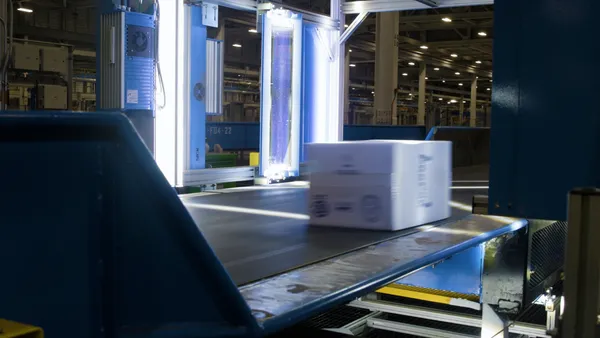Dive Brief:
- A new report by investment research firm CDP explored the ability of the world’s largest publicly listed consumer goods companies to adapt to new demands for environmental sustainability, ranking them by their readiness to transition to a low-carbon economy.
- In the food and beverage space, Danone ranked first, followed by Nestlé and AB InBev. Kraft Heinz ranked last, with Mondelez and Coke also near the bottom. Carole Ferguson, head of investor research at CDP, said some companies are taking action with environmental issues, but "these efforts need to be replicated by others in the sector."
- Despite innovations within the space aimed at lowering emissions, almost 60% of the top 10 revenue generating brands for each company have failed to deliver low carbon innovations in the last decade, according to the report.
Dive Insight:
Sustainability is a topic that can drive brand growth as much as new and popular products. In fact, a Horizon Media study found 81% of millennials expect companies to make public commitments to good corporate citizenship. Two-thirds of consumers will pay more for products from brands committed to environmentally friendly practices, according to the Nielsen Global Corporate Sustainability Report.
Making the change to become sustainable from the inside out, however, is a challenge for many companies. Interestingly, low-carbon innovation often comes through M&A that brings smaller, more environmentally conscious companies on board to larger firms. In terms of sustainability, the study found core brands remain unchanged.
However, some of the sustainability components this study investigated are not necessarily items a consumer would notice in the end product. The study looked at a company's water usage and emissions, which demands a consumer is paying strict attention to a company in order to remain aware of their practices. At the same time, it examined companies' willingness to invest in more environmentally friendly packaging, finding 63% of companies are investing to advance depolymerization and recycling infrastructure.
A big point of change was the companies' interest in vegan and plant-based alternatives. Five out of the seven companies that aren't strictly beer manufacturers have innovated existing dairy or meat-based products to offer vegan options. They are interested in a consumer trend that will not only enliven and keep their product offerings on trend, but will be an environmentally-sound decision. One of the masters of this product reorientation is Danone.
Last February, Danone's CEO Emmanuel Faber told CNBC the company wanted accelerated growth in 2018 by "paving the way for Danone to really be leading the food revolution that is sweeping the (better-for-you) category" and to be "the largest plant-based alternative."
That drive to diversify within the category has resulted in a company with a number of brands that allow Danone to take that focus to several categories rather than relying on one legacy core brand for its revenue. To accomplish this, the company acquired plant-based foods maker WhiteWave in 2017 for $12.5 billion and then increased its environmental stewardship by achieving B Corp certification last April — a certification that tells consumers the company is adhering to higher standards in transparency, accountability and standing for good causes. Danone recently saw a sales boost in earnings so it looks like prioritizing these values is working for them.
It seems like American packaged food companies are lagging behind their European counterparts. The top three companies on this report are foreign, and PepsiCo ranks fourth. This may be due to increased regulatory pressure in Europe to reduce packaging waste at the source as well as improving recycling and recovery. More reductions in product labeling and in carbon footprints may be on the horizon.
With legislation like this taking hold in Europe, there is a good chance that the movement will increasingly spill over into the United States. When this arrives, it will likely be beneficial for those companies who have preemptively invested in sustainability as it will not only help bolster their reputation, but it will allow them to more easily comply with regulations that demand smaller environmental footprints.














